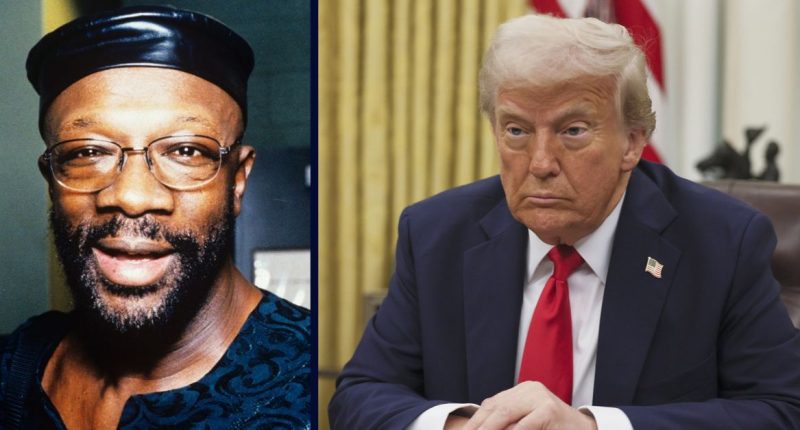
Left: Left: Grammy award winning musician Isaac Hayes in May of 2000 (Scott Weiner / MediaPunch /IPX). Right: President Donald Trump listens to a question from a reporter before signing an executive order in the Oval Office of the White House in Washington, Monday, March 31, 2025 (Pool via AP).
A federal judge ruled Wednesday that President Donald Trump must face a copyright lawsuit over his alleged use of the 1966 Isaac Hayes song “Hold On, I’m Coming” during his presidential campaign.
Bill Clinton appointee U.S. District Judge Thomas Thrash Jr. denied a motion filed by Trump’s legal team to dismiss the lawsuit waged by the family of the late Grammy Award-winning Hayes for copyright infringement.
“Great morning in Federal Court,” Hayes’ son Isaac Hayes III wrote in a post on X (formerly Twitter) on Wednesday. “Grateful to the Court for denying the motion to dismiss filed by Donald Trump, Donald Trump for President, and Turning Point USA in our copyright case. We move forward.”
Great morning in Federal Court. Grateful to the Court for denying the motion to dismiss filed by Donald Trump, Donald Trump for President, and Turning Point USA in our copyright case. We move forward. @jameslwalkeresq @Lizgarnergroup @MsGinaRyan pic.twitter.com/23L6QVmXD1
— Isaac Hayes III (@IsaacHayes3) April 2, 2025
As Law&Crime has previously reported, Hayes’ estate and son Isaac Hayes III in 2024 followed through on their public threats to sue last August after Trump used the song during campaign rallies.
“Today, on the anniversary of my father [Isaac Hayes’] death we have repeatedly asked Donald Trump, the RNC and his representatives not to use ‘Hold on I’m Coming’ written by Isaac Hayes and David Porter during campaign rallies but yet again, in Montana they used it,” Hayes III wrote on X at the time “Donald Trump represents the worst in integrity and class with his disrespect and sexual abuse of Women and racist rhetoric.”
In addition to Trump and his campaign, defendants initially included Turning Point USA (Turning Point), the Republican National Committee (RNC), the National Rifle Association (NRA), and the organizer of the Conservative Political Action Conference (CPAC). However, in September, the plaintiffs voluntarily amended their lawsuit to drop the RNC, NRA, and CPAC form the case.
The remaining defendants moved to dismiss on both procedural and substantive grounds. Among them were the claims that plaintiffs did not really own the copyrights to the song and that the Georgia-based federal court lacked personal jurisdiction over the defendants.
The plaintiffs not only contested the defense’s arguments, but even filed a motion for sanctions against Trump and the campaign arguing that the defendants’ motion to dismiss was “riddled with false statements,” and “outright ignores established law.”
In their motion for sanctions, the plaintiffs argued that Turning Point’s contacts with the state of Georgia are far more robust than would be required to meet the minimum standards for jurisdiction.
“As we have said multiple times now, Plaintiffs know and it is public knowledge that Turning Point conducts business in GA,” said the filing. “Likewise, that same business activity (grassroots political activity within the state of Georgia, such as college coalition chapters, canvassing, and various political events) will satisfy the federal due process requirements for general jurisdiction over Turning Point because that business is continuous and systematic.”
In a ruling issued Wednesday, Thrash denied the defense’s motion to dismiss the case, and also denied the plaintiffs’ motion for sanctions. A written opinion is still forthcoming in the case, which will now proceed toward trial.
Law&Crime reached out to attorneys for the parties for comment, but did not hear back from Trump’s legal team.
Attorneys for the plaintiffs declined to comment on the ruling.
Love true crime? Sign up for our newsletter, The Law&Crime Docket, to get the latest real-life crime stories delivered right to your inbox.








